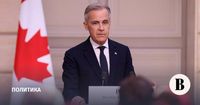Canadian Prime Minister Mark Carney has officially invited Ukrainian President Vladimir Zelensky to attend the upcoming G7 summit, set to take place in June 2025, in Alberta, Canada. The invitation was conveyed during a telephone conversation held over the weekend of March 15-16, shortly after Carney took office as the new Prime Minister.
Carney, who assumed leadership on March 14, 2025, with 85.9% of the votes following party elections, extended this diplomatic gesture as part of Canada's continued support for Ukraine amid its geopolitical conflicts with Russia. The invitation marks not just personal diplomatic efforts but also showcases Canada's commitment to addressing global security issues.
Before Carney's ascent to the role, the government was led by Justin Trudeau, who announced his resignation earlier this year, marking a significant transition after nearly eight years in office since autumn 2015. Trudeau's leadership was characterized by efforts to solidify Canada's role on the international stage, particularly concerning Eastern European affairs, as evidenced by his earlier support for Ukraine following Russia's annexation of Crimea.
The G7, which includes leading global economies such as the USA, UK, Germany, France, Italy, Canada, and Japan, is positioned as one of the foremost platforms for leaders to discuss pressing global issues. It was initially known as the G8 when Russia was also included; this changed after the 2014 crisis. Despite past tensions, UK Security Minister Ben Wallace recently speculated about the potential for Russia's re-entry to the G7, emphasizing the necessity of discussing this with international allies.
During his comments, Wallace stated, "We could discuss Russia's reintegration during meetings with international allies." This sentiment echoes the varied viewpoints surrounding the G7's current composition, as debates continue about whether excluding Russia was justified.
Adding to the discourse, former President Donald Trump expressed, "I believe excluding Russia was a mistake," raising eyebrows and prompting discussions globally on the realities of international diplomacy and the ever-evolving political alliances.
Such dynamics reflect the broader clash between Western countries and Russia, reinforcing Ukraine's significance amid these talks and the role of Western leaders. Notably, Zelensky's invitation to attend the summit can be seen as both symbolic and practical, showcasing Western unity against perceived aggression from Russia.
The upcoming G7 summit will be closely watched, not only for the discussions surrounding economic recovery and climate change but also for the international relations impact, especially concerning Ukraine and its allies. Carney's proactive outreach to Zelensky underlines Canada’s strong ties with Ukraine and signals its readiness to stand firm against pressures from Russia.
While the political environment has been tense, with discussions about military support and humanitarian aid to Ukraine taking center stage, the invitation to Zelensky stands as both encouragement and recognition of Ukraine's resilience and its fight for sovereignty. The international community will undoubtedly be monitoring reactions as the summit approaches, particularly from Russia and its allies.
Conversations surrounding the G7 and its expansion or reversal of decisions made years ago will likely shape the future diplomatic narrative. The bridges forged, or burned, during these discussions could have lasting repercussions on geopolitical stability, particularly within Eastern Europe.
Overall, Carney’s engagement with Zelensky signifies not just readiness to cooperate on regional security but also denotes Canada's broader vision for international unity against threats. The G7 summit, with Zelensky’s invitation, is poised to be more than just another meeting of developed economies; it will serve as a pivotal moment for establishing collective responses to contemporary challenges impacting global peace and security.


